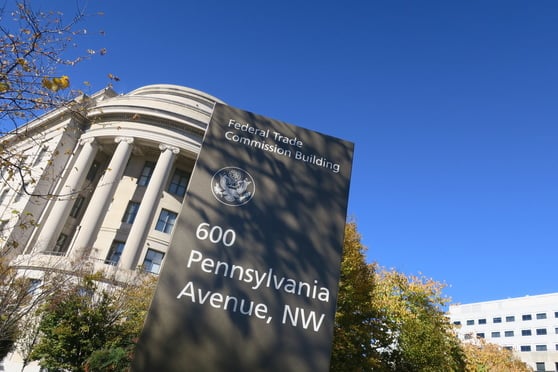A Trip to the Soviet Bloc Shaped This FTC Nominee, and Other Disclosure Tidbits
Christine Wilson, formerly Delta's SVP for legal, regulatory and international, recalls a 1984 high school trip to the Soviet bloc that would shape her world view. And other tidbits from the questionnaires filed by former Paul Weiss partner Joe Simons; congressional lawyer Noah Phillips, chief counsel to Sen. John Cornyn; and Rohit Chopra of the Consumer Federation of America.
February 07, 2018 at 04:51 PM
7 minute read

On a high school trip in 1984, Christine Wilson traveled to several countries in the Soviet bloc, getting a peek behind the Iron Curtain that she would recall 34 years later as a Federal Trade Commission nominee.
Wilson, a former Delta Air Lines executive in charge of legal, regulatory and international, was named in January as one of the Trump administration's four picks to fill the FTC. Unlike the other nominees, her name had not been publicly floated as a potential pick before the administration announced its four selections in January.
Introducing herself to the Senate Commerce Committee, Wilson, formerly an antitrust partner at Kirkland & Ellis and O'Melveny & Myers, traced her career back to that formative high school trip in 1984.
 Christine Wilson
Christine Wilson“During that trip, I witnessed first-hand the consequences of an authoritarian government and a centrally planned economy, and finished that trip an ardent advocate for a market economy and personal liberty,” Wilson wrote in response to a question about her background and why she wants to serve as an FTC commissioner.
Wilson highlighted her time as chief of staff to former FTC chairman Tim Muris, now a senior counsel at Sidley Austin, who led the agency in the first half of the George W. Bush administration. She counted her time as Muris' chief of staff as “the most important experience of my professional career to date.”
In a separate portion of the questionnaire, Wilson said the FTC should keep up its close scrutiny of the health care sector. The FTC in recent years has challenged several proposed hospital mergers and also ordered divestitures as a condition for other health sector deals.
“The continuing growth of this sector, combined with significant concerns about health care costs, misuse of sensitive data, and burgeoning occupational licensing requirements, underscore the need for the FTC to maintain its focus on this industry,” Wilson wrote. “It is imperative for the FTC to continue increasing its understanding of how these developments affect patient choice and the quality of patient care, and how these changes should be incorporated into the commission's advocacy and enforcement efforts.”
According to the questionnaire and a review of federal campaign finance records, Wilson has consistently donated to Republican presidential candidates—but she did not contribute to Trump's campaign. In March 2016, she donated $2,700 to U.S. Sen. Ted Cruz's presidential campaign. She previously donated to former Massachusetts Gov. Mitt Romney's presidential bid and advised U.S. Sen. John McCain's presidential campaign on antitrust issues.
What follows are highlights from Senate questionnaires from the three other nominees—former Paul, Weiss, Rifkind, Wharton & Garrison partner Joseph Simons; congressional lawyer Noah Phillips, chief counsel to U.S. Sen. John Cornyn, R-Texas; and Rohit Chopra of the Consumer Federation of America. The nominees are expected to appear Feb. 14 at the Senate Commerce Committee for their confirmation hearings.
Hey, Joe, we thought you left Paul Weiss? Well, not exactly. Just because Simons has departed Paul Weiss doesn't immediately end his ties there. Simons told the Senate: “Pursuant to the firm's partnership agreement and the firm's handbook, I have been provided an office, secretarial services, access to a computer and computer services, and the ability to participate in the firm's health insurance plan. Upon confirmation, I will forgo all of these benefits.” Simons was formerly co-chair of the antitrust team at the firm, where he worked from 2003 to Dec. 31, 2017. Previously, he was a partner at Clifford Chance in Washington from 1998 to 2001. Simons was an associate at Skadden, Arps, Slate, Meagher & Flom from 1985 to 1987, and an associate at Wachtell, Lipton, Rosen & Katz from 1989 to 1994.
Chopra spotlights big data as one of the three biggest challenges facing the agency. “Big data is offering new opportunities in almost every sector of the economy. At the same time, it raises important questions with respect to consumer protection, privacy and competition that require thoughtful examination.” Chopra also said the FTC should expect to be busy. Despite expectations of rising interest rates, he said, merger activity is “likely to be robust” in light of strong corporate earnings. “The macroeconomic environment has significant implications for the type of work the commission can expect to address in the upcoming years,” he wrote. “The commission must ensure that it has a clear view into the broader economic environment.”
Phillips answered “yes” to whether he'd ever been arrested. As a sophomore at Dartmouth College, Phillips was arrested for underage drinking. He told the Senate: “My roommates and I were not yet 21, and the Hanover Police Department (HPB) shut down the party following a complaint. I was arrested for the unlawful possession of alcohol. The charges were dropped following my participation in the HPD's Alcohol Diversion Program.”
 Noah Phillips, chief counsel to senator John Cornyn, R-Texas. Credit: Diego M. Radzinschi / NLJ
Noah Phillips, chief counsel to senator John Cornyn, R-Texas. Credit: Diego M. Radzinschi / NLJ OK, but some more meaty stuff about Phillips, a 2005 Stanford Law School graduate: His Big Law ties are strong. Phillips was an associate at Cravath, Swaine & Moore from 2006 to 2010, and an associate for a year at Steptoe & Johnson LLP from 2010 to 2011. At Cravath, Phillips handled fraud and antitrust matters, among other issues. “I supervised teams of junior attorneys, accountants and support staff on a variety of matters, including litigation and internal investigations.” Phillips told the Senate: “The FTC's antitrust, consumer protection and public education missions are as important to the American economy as ever. Technology and business practices are evolving rapidly, public discussion about antitrust is growing loudly and Americans are grappling with increasing healthcare costs and new realities of data privacy.”
Simons wants the FTC to look at whether merger enforcement has been too soft. “Significant concerns have been raised that the federal antitrust agencies have been too permissive in dealing with mergers and acquisitions, resulting in harm to consumer welfare via increased prices, limited consumer choice and harm to workers.” He added: “Even if the evidence shows no such failure, it would be good practice to evaluate more systematically the commission's merger enforcement program through the regular use of retrospective studies to prevent potential problems in the future.”
Read more:
Joseph Simons of Paul Weiss, Trump's FTC Chair Pick, Reports $1.9M in Partner Share
FTC Nominee Christine Wilson Discloses Her In-House Earnings at Delta
Paul Weiss Antitrust Leader, Delta Regulatory Counsel Among 4 FTC Nominees
Trump Picks FTC's Maureen Ohlhausen for Federal Claims Court Slot
FTC's Equifax Investigation Is Part of 'Unprecedented' Year Ahead
Microsoft Hires Ex-FTC Commissioner as Cybersecurity, Privacy Lead
This content has been archived. It is available through our partners, LexisNexis® and Bloomberg Law.
To view this content, please continue to their sites.
Not a Lexis Subscriber?
Subscribe Now
Not a Bloomberg Law Subscriber?
Subscribe Now
NOT FOR REPRINT
© 2025 ALM Global, LLC, All Rights Reserved. Request academic re-use from www.copyright.com. All other uses, submit a request to [email protected]. For more information visit Asset & Logo Licensing.
You Might Like
View All

SEC Official Hints at More Restraint With Industry Bars, Less With Wells Meetings
4 minute read

Sidley Adds Ex-DOJ Criminal Division Deputy Leader, Paul Hastings Adds REIT Partner, in Latest DC Hiring
3 minute readTrending Stories
- 1Delaware Supreme Court Names Civil Litigator to Serve as New Chief Disciplinary Counsel
- 2Inside Track: Why Relentless Self-Promoters Need Not Apply for GC Posts
- 3Fresh lawsuit hits Oregon city at the heart of Supreme Court ruling on homeless encampments
- 4Ex-Kline & Specter Associate Drops Lawsuit Against the Firm
- 5Am Law 100 Lateral Partner Hiring Rose in 2024: Report
Who Got The Work
J. Brugh Lower of Gibbons has entered an appearance for industrial equipment supplier Devco Corporation in a pending trademark infringement lawsuit. The suit, accusing the defendant of selling knock-off Graco products, was filed Dec. 18 in New Jersey District Court by Rivkin Radler on behalf of Graco Inc. and Graco Minnesota. The case, assigned to U.S. District Judge Zahid N. Quraishi, is 3:24-cv-11294, Graco Inc. et al v. Devco Corporation.
Who Got The Work
Rebecca Maller-Stein and Kent A. Yalowitz of Arnold & Porter Kaye Scholer have entered their appearances for Hanaco Venture Capital and its executives, Lior Prosor and David Frankel, in a pending securities lawsuit. The action, filed on Dec. 24 in New York Southern District Court by Zell, Aron & Co. on behalf of Goldeneye Advisors, accuses the defendants of negligently and fraudulently managing the plaintiff's $1 million investment. The case, assigned to U.S. District Judge Vernon S. Broderick, is 1:24-cv-09918, Goldeneye Advisors, LLC v. Hanaco Venture Capital, Ltd. et al.
Who Got The Work
Attorneys from A&O Shearman has stepped in as defense counsel for Toronto-Dominion Bank and other defendants in a pending securities class action. The suit, filed Dec. 11 in New York Southern District Court by Bleichmar Fonti & Auld, accuses the defendants of concealing the bank's 'pervasive' deficiencies in regards to its compliance with the Bank Secrecy Act and the quality of its anti-money laundering controls. The case, assigned to U.S. District Judge Arun Subramanian, is 1:24-cv-09445, Gonzalez v. The Toronto-Dominion Bank et al.
Who Got The Work
Crown Castle International, a Pennsylvania company providing shared communications infrastructure, has turned to Luke D. Wolf of Gordon Rees Scully Mansukhani to fend off a pending breach-of-contract lawsuit. The court action, filed Nov. 25 in Michigan Eastern District Court by Hooper Hathaway PC on behalf of The Town Residences LLC, accuses Crown Castle of failing to transfer approximately $30,000 in utility payments from T-Mobile in breach of a roof-top lease and assignment agreement. The case, assigned to U.S. District Judge Susan K. Declercq, is 2:24-cv-13131, The Town Residences LLC v. T-Mobile US, Inc. et al.
Who Got The Work
Wilfred P. Coronato and Daniel M. Schwartz of McCarter & English have stepped in as defense counsel to Electrolux Home Products Inc. in a pending product liability lawsuit. The court action, filed Nov. 26 in New York Eastern District Court by Poulos Lopiccolo PC and Nagel Rice LLP on behalf of David Stern, alleges that the defendant's refrigerators’ drawers and shelving repeatedly break and fall apart within months after purchase. The case, assigned to U.S. District Judge Joan M. Azrack, is 2:24-cv-08204, Stern v. Electrolux Home Products, Inc.
Featured Firms
Law Offices of Gary Martin Hays & Associates, P.C.
(470) 294-1674
Law Offices of Mark E. Salomone
(857) 444-6468
Smith & Hassler
(713) 739-1250








